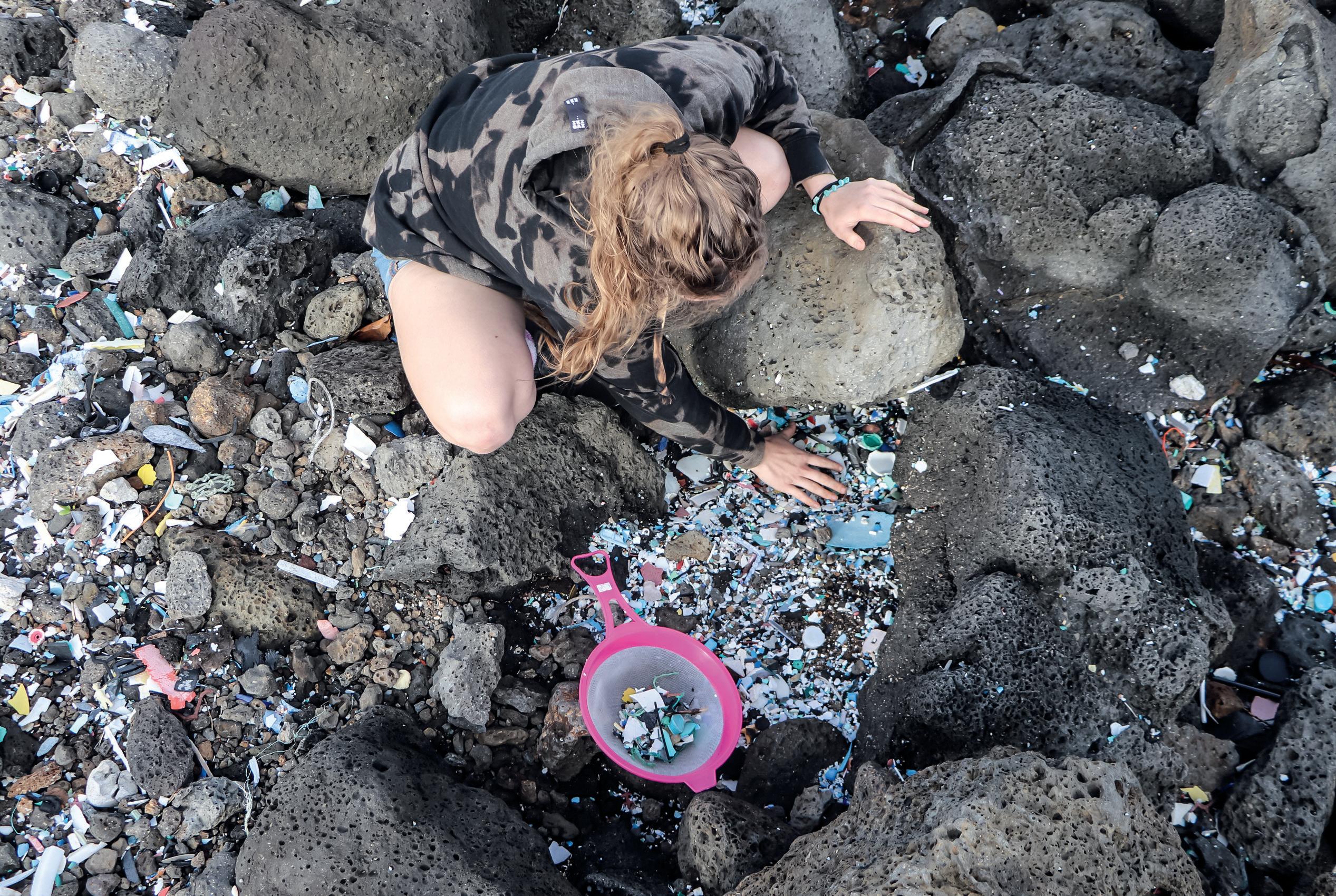
F rom a distance, the colourful beach at Ovahe seems a postcard-perfect mosaic of natural beauty. Craggy volcanic boulders, pockmarked from bubbling lava, jut from the sand, garnished by a necklace of pastel-coloured corals and seashells pounded to pieces by the wild, crashing surf.
As the waves pull back, however, another reality emerges. The sand holds few corals or shells. Instead, the high-tide mark is a carpet of plastics polished into an array of bleached Coca-Cola reds and Pepsi blues.
"Look at all this," says Kina Paoa Kannegiesser, 22, using a kitchen sieve to scoop up bottle caps, shampoo bottle shards and disposable razors. The ocean rubbish is crammed into every nook and cranny along this remote beach on Easter Island, a 163 sq km speck of land.
About 3,700km west of central Chile, Easter Island (also known as Rapa Nui) is among the most remote spots on Earth- and among the most polluted. It is estimated that 50 times more plastic washes ashore on these beaches than on the Chilean mainland, largely a result of the vast spiralling current known as the South Pacific gyre. This current acts like a funnel, sucking in plastic from as far away as the Galápagos Islands and New Zealand and, with every tide, depositing a wave of floating rubbish.
Picking through the sand, Paoa Kannegiesser holds an example of a coral colony forming on the lattice of a plastic fish bin discarded by the industrial fishing fleets that almost encircle this island as they chase dwindling schools of tuna. She collects fish bins by the dozen and lately has been finding coral that has fused with the debris to form an organic-plastic sandwich.
Denne historien er fra June 28, 2024-utgaven av The Guardian Weekly.
Start din 7-dagers gratis prøveperiode på Magzter GOLD for å få tilgang til tusenvis av utvalgte premiumhistorier og 9000+ magasiner og aviser.
Allerede abonnent ? Logg på
Denne historien er fra June 28, 2024-utgaven av The Guardian Weekly.
Start din 7-dagers gratis prøveperiode på Magzter GOLD for å få tilgang til tusenvis av utvalgte premiumhistorier og 9000+ magasiner og aviser.
Allerede abonnent? Logg på

Cutting a dash
Scissor Sisters are reuniting to celebrate 20 years since their debut album. They talk fans, Elton John and connecting with the UK's weird’ energy

How art led resistance to Pakistan's dictatorship
A dazzling exhibitionin Qatar reveals how the repressive regime of Zia-ul-Hag led prompted a powerfulcreative defiance

The death of the middleclass professional spells danger for Labour
What does it mean to have a middle-class, white-collar professional job?

I love travelling Europe by train, but a joined-up approach is needed
Last August, I took the train from Trieste to Ljubljana, following a route once used by the Orient Express.

How will 2025 turn out? The life of Jimmy Carter offers us a clue Jonathan Freedland
How will we look back on 2025? Or, if that seems too absurd a question to ponder just a few days into the new year, how might we view the first quarter of the 21st century? As it happens, the answer to both questions is the same and it was confirmed by an event that came as the old year faded and the new one began.

15 ways to overcome overwhelm
Readers and wellbeing experts share tips on corralling chaos and avoiding anxiety, from journalling to cherishing nature

Overwhelmed? Here's how to fix it
Modern life is exhausting. Here, Guardian writers explain what they have given up to make space in their schedules and lives from social media to makeup to news addiction. Then, readers and experts offer tips on how to navigate the demands and pressures we all face. First, Emine Saner examines why we are so overwhelmed

Seoul standoff Impeached president fights on despite arrest attempt
South Korean anticorruption officials attempting to arrest the country's suspended president, Yoon Suk Yeol, must know by now what he meant by his repeated vows to \"fight to the end\".

'Don't feed the troll': European leaders hit back at Musk
When the German chancellor, Olaf Scholz, was asked in an interview about the barrage of insults being directed at him and other German leaders by Elon Musk, the world's richest man, his reply was: \"Don't feed the troll.\"

History lessons The two steps that could stop societal collapse
Academic Danilo Brozović says studies of failed civilisations all point in one direction-the need for radical transformation to survive